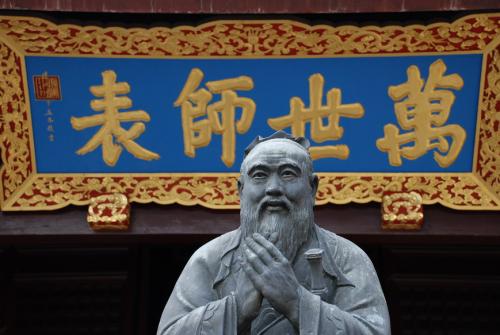


(File photo of a Confucius statue)
Confucian academics and government officials turned up on Wednesday at the 8th World Confucian Conference, in the hometown of Confucius, for a grand gathering to look for ways to revive and apply Confucianism in today's China.
The theme of this year's conference, in Qufu, Shandong Province, is "Confucianism and a community of shared future for mankind." The two-day event is an academic and cultural one, and invited more than 300 Confucian scholars and sinologists from at least 30 countries and regions to attend, the Xinhua News Agency reported.
In commenting on the event, experts said they applauded the revival of Confucianism, even though its current status in the country has changed dramatically over the past century.
The first conference was held in 2008. This year's was sponsored by the Ministry of Culture and the Shandong provincial government, according to the website of Shandong University, a co-organizer of the event.
The Chinese government and the Communist Party of China (CPC) now hold very different views on Confucianism compared with the past, experts say.
"Since the May 4th Movement, in 1919, up to the Cultural Revolution (1966-76), Confucianism was blamed by many of China's elites as obstructing the social development of the country," Su Wei, a professor at the Chongqing Municipal Party Committee's Party School, told the Global Times.
In the early stages of China's anti-imperialist moves and pursuit of modernization, most of the elite considered Confucianism a "feudal ideology" that would cause China to miss out on industrialization opportunities.
It was also despised by the CPC until the reforms and opening up in the late 1970s, after which it gradually regained support and popularity among the common folk and the government.
Big change
In a keynote speech on September 24, 2014, which was the 2,565th anniversary of Confucius' birth, President Xi Jinping said, "With Confucianism and other philosophies and cultures taking shape and growing in China, they are records of spiritual experiences, rational thinking and cultural achievements of the nation during its time of striving to build its home," the Xinhua News Agency reported. Xi added that these cultures have nourished the Chinese nation and helped it flourish.
"Chinese traditional culture, represented by Confucianism, can provide stable values to enhance social cohesion and the sense of identity," said Wang Xuedian, executive vice-president of Shandong University's Advanced Institute of Confucian Studies.
The Party School's Su added, "The reason the CPC and China changed their attitude toward Confucianism is that China is getting much more confident of its own culture as a result of its development, and the country needs a homegrown culture to counter the impact of other cultures, otherwise it will lose the roots of its civilization."
Xi also noted that traditional Chinese culture may provide enlightenment for people and help them to understand and improve the world as well as governance, and he called on people to regard traditions in a scientific way and carry on traditional culture while developing more current ones.
Chinese traditional culture is not just about one man or one ideology, and Confucianism has some unenlightened and feudal parts. Traditional culture is the root, but our soul needs to be modernized. We also can learn from foreign cultures that suit Chinese society, Su concluded.
With China's growing global influence, Confucianism might also be getting more influential in other countries and the growing number of Confucius Institutes is delivering Confucianism to other countries through Chinese language education, said Guo Dingping, former dean of the Nottingham-Fudan Confucius Institute.
 Fire brigade in Shanghai holds group wedding
Fire brigade in Shanghai holds group wedding Tourists enjoy ice sculptures in Datan Town, north China
Tourists enjoy ice sculptures in Datan Town, north China Sunset scenery of Dayan Pagoda in Xi'an
Sunset scenery of Dayan Pagoda in Xi'an Tourists have fun at scenic spot in Nanlong Town, NW China
Tourists have fun at scenic spot in Nanlong Town, NW China Harbin attracts tourists by making best use of ice in winter
Harbin attracts tourists by making best use of ice in winter In pics: FIS Alpine Ski Women's World Cup Slalom
In pics: FIS Alpine Ski Women's World Cup Slalom Black-necked cranes rest at reservoir in Lhunzhub County, Lhasa
Black-necked cranes rest at reservoir in Lhunzhub County, Lhasa China's FAST telescope will be available to foreign scientists in April
China's FAST telescope will be available to foreign scientists in April "She power" plays indispensable role in poverty alleviation
"She power" plays indispensable role in poverty alleviation Top 10 world news events of People's Daily in 2020
Top 10 world news events of People's Daily in 2020 Top 10 China news events of People's Daily in 2020
Top 10 China news events of People's Daily in 2020 Top 10 media buzzwords of 2020
Top 10 media buzzwords of 2020 Year-ender:10 major tourism stories of 2020
Year-ender:10 major tourism stories of 2020 No interference in Venezuelan issues
No interference in Venezuelan issues
 Biz prepares for trade spat
Biz prepares for trade spat
 Broadcasting Continent
Broadcasting Continent Australia wins Chinese CEOs as US loses
Australia wins Chinese CEOs as US loses